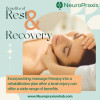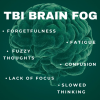Resilience is the ability to adapt positively to changes and build yourself back up after experiencing obstacles in our lives (e.g., adversity, trauma, unexpected problems and tragedies). To be resilient means that even though you cannot always change your current circumstance, you try your best to cope, modify, or change the aspects that you can control. To be resilient does not mean you will not experience pain or stress, it is how you deal with the challenges you have been faced with and consists of a combination of thoughts, behaviors, and actions that are important to develop and continuously work on throughout our lives. It is an active process. After a brain injury (BI), individuals deal with a new reality and can be faced with limitations and changes in their personal relationships, employment status, leisure activities, and education. Participation deficits in everyday activities can significantly affect individuals’ mental health, self-esteem, and their overall sense of self.
Studied have found that resilient individuals demonstrate certain characteristics such as being more socially competent and present better physical health and emotional wellness than individuals that do not exhibit resilient characteristics. They also exhibit proactive behaviors rather than reactive behaviors, have better mental flexibility, find more solutions to deal with challenges (resourcefulness), and value positive emotions. Furthermore, studies found higher resilience in individuals with a BI was correlated with better emotional adjustments, increased participation (e.g., social relationships, leisure, and productivity) and their ability to reintegrate into the community. Resilience was also found as a protective factor against experiencing depression as well. Strategies to improve resilience will depend on evaluating a combination of static (unmodifiable) factors such as age, sex, intellectual abilities, and their psychiatric history and dynamic (modifiable) factors which includes can include social support, nutrition, exercise and even socioeconomic status. It is also important to note that resilience requires certain skills such as having good judgment, problem-solve skills, emotional stability. Factors and strategies are listed in the template below.
| Dynamic (modifiable) Protective Factors / Strategies | |
| Support system
|
Studies have found the following:
Benefits of having a good support system which can include family system can help increase feelings of self-worth and help view your problems in perspective. Finding a mentor, role model, or support who have endured similar experiences or demonstrate resilient traits will be beneficial to learn from them and vent about your feelings as well. |
| Spirituality or Religion |
|
| Exercise |
|
| Nutrition |
|
| Sleep |
|
| Coping strategies include a combination of small efforts such as:
|
|
References:
Wardlaw, C., Hicks, A. J., Sherer, M., & Ponsford, J. L. (2018). Psychological Resilience Is Associated With Participation Outcomes Following Mild to Severe Traumatic Brain Injury. Frontiers in neurology, 9, 563. https://doi.org/10.3389/fneur.2018.00563
Holland, J. N., & Schmidt, A. T. (2015). Static and Dynamic Factors Promoting Resilience following Traumatic Brain Injury: A Brief Review. Neural plasticity, 2015, 902802. https://doi.org/10.1155/2015/902802
Elliott, T. R., Hsiao, Y. Y., Kimbrel, N. A., Meyer, E., DeBeer, B. B., Gulliver, S. B., Kwok, O. M., & Morissette, S. B. (2017). Resilience and Traumatic Brain Injury Among Iraq/Afghanistan War Veterans: Differential Patterns of Adjustment and Quality of Life. Journal of clinical psychology, 73(9), 1160–1178. https://doi.org/10.1002/jclp.22414
The Best Brain Possible. (2018). The Neuroscience of Building a Resilient Brain. https://thebestbrainpossible.com/neuroscience-resilient-brain-stress/
Evie. (2018). Building mental resilience after brain injury. Redefining Normal. http://refindingnormal.com/en/2018/04/04/mental-resilience-brain-injury/
Wilkens. (n.d.). Building Resilience Part III: Sleep, Exercise, and Health. Center for Motivation and Change. https://motivationandchange.com/building-resilience-part-iii-sleep-exercise-health/
American Psychological Association. (2012). Building your resilience. American Psychological Association. https://www.apa.org/topics/resilience
Naval Center for Combat & Operational Stress Control. (2013). Resilience: The Bounce Back Factor. BrainLine. https://www.brainline.org/article/resilience-bounce-back-factor
“Trajectories of Affective Balance 1 Year After Traumatic Injury: Associations with Resilience, Social Support, and Mild Traumatic Brain Injury”



